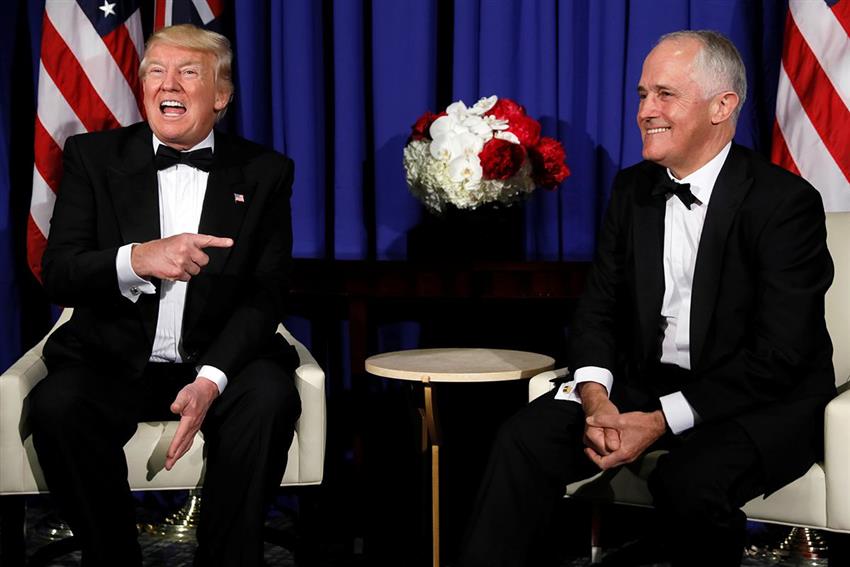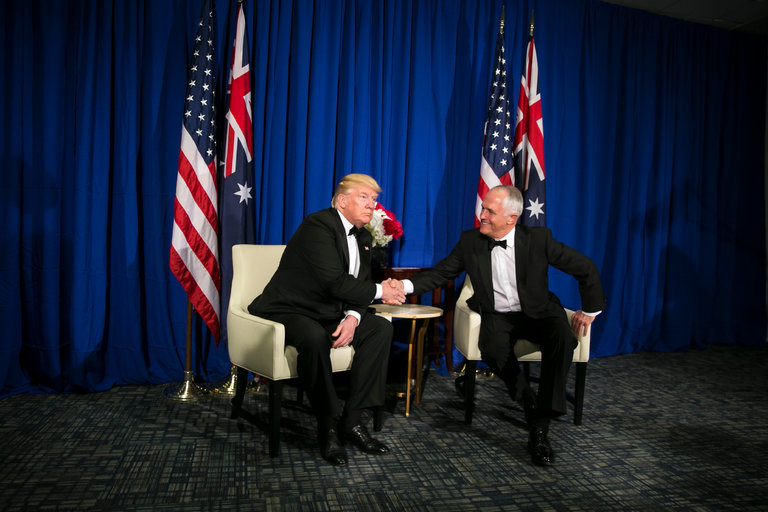
First an awkward handshake, having been stood up for three hours in New York by Donald John Trump while he celebrated his great ‘victory’ in the House with the passage of an Obamacare repeal Bill and its replacement with the American Health Care Act, then wearing a rictus grin that bespoke obsequiousness writ large, our Prime Minister
applauded Trump with:
”Well done” and
"It's always good to win a vote in the Congress, or the parliament as we call it, I've got to say, it's always satisfying to win a vote when people predict you’re not going to win it too. So keep at it, it's great."
Of course Turnbull apologists, such as Michael Stutchbury on this week’s
Insiders, played down Turnbull’s remarks as a reflex response that carried no sinister implications. But Turnbull
could have said: “You must be relieved”, or “It’s taken a long while”, or even “Sometimes passing legislation can be difficult”, but no, he
congratulated him, as if he had done something praiseworthy.
Tweeter John Wren said it all with this acerbic tweet:
Behaving like a lapdog of the US President is undignified and unworthy of a representative of this nation. Trump’s demeanour is more deserving of the proverbial ‘bird’.
It was not just Turnbull’s obsequiousness that offended, it was his tacit acknowledgement of Trump's 'victory' in destroying healthcare for millions of Americans, as if that was a fine accomplishment.
The changes passed by the House are complicated to describe, but here’s an attempt. What follows are abridged abstracts from an article by Ross Barkan, a journalist who contributes to several US publications, titled:
America's healthcare being driven off a cliff by nihilists published in the 5 May issue of
The Guardian:
Ryan’s Republican Congress, after trying and failing to hold a vote on a repeal of the Affordable Care Act (AKA Obamacare) in March, has rounded up the votes to pass the American Health Care Act, perhaps the worst piece of life-altering legislation to ever see the light of day.
This bill won over a few so-called moderate Republicans because it now includes an amendment that would allow states to waive an ACA rule that forbids charging sick people higher insurance prices, as long as the states set up a special insurance pool for those people. The amount of money allocated for this? A paltry $8bn.
A quick recap: Ryan’s legislation (calling it ‘Donald Trump’s bill’ gives too much credit to a man wholly disinterested in anything that smells of policy) will scrap the ACA’s mandate to buy health insurance, substantially cut Medicaid, and hope somehow this doesn’t cause premiums to skyrocket.
The nonpartisan Congressional Budget Office (CBO) found that 24 million Americans would lose their health insurance under a version of the legislation considered in March. The CBO hasn’t had the time to score this bill. Republicans aren’t interested in finding out just how much of a disaster they’re going to inflict on regular people. They have a campaign pledge to fulfill, after all.
Were an alien to wander down to Earth and examine the functionality of American democracy in 2017, it would find an intellectual graveyard.
Lawmakers tasked with carefully considering remarkably complex legislation with the potential to significantly alter the lives of millions of people are instead rushing to vote for a bill that they know almost nothing about and that no outside expert has had the time to seriously assess. This is insanity.
The healthcare bill will funnel $100bn to states over a decade to stabilize what are sure to be markets wracked by chaos, assuming this legislation survives intact to Trump’s desk. Amendments provide another $30bn to states with few strings attached. If somehow all of this money is used just for the high-risk pools, it will come out to $138bn, which sounds impressive enough. But most healthcare researchers believe a competently run national high-risk pool would cost much more.
Factoring in lifetime caps on coverage and longer waiting periods, one 2010 estimate from two conservative health economists found such a pool would cost $150bn-$200bn over a decade. Other recent estimates believe the price tag to be much higher.
If you are keen to study the stark differences between Trump’s and Obama’s Healthcare Bill, read freelance journalist Joanna Walter’s account of them in 4 May issue of
The Guardian:
Obamacare v the revised Republican healthcare bill: the key differences.
I trust the above account of Trump’s American Healthcare Act is sufficient to appraise you of the devastating affects of repealing Obamacare in favour of this one: millions disenfranchised, and an estimate that many thousands will die as a result. An article in
Vox is headed:
The GOP plan for Obamacare could kill more people each year than gun homicides, and sub-headed:
If 24 million people lose insurance, we'll see more than 24,000 extra deaths per year. The headings tell us plenty, but if you want the gory details,
click here.
However, the Senate may prove to be a much bigger hurdle for Trump, who may find his ‘victory’ celebrations premature. Major changes to the Bill are predicted, months of delay are anticipated, and failure to pass ‘Trumpcare’ may be the eventual outcome.
Trump, in his usual careless style, added complexity to an already convoluted debate by saying:
“We have failing health care. I shouldn’t say this to our great gentleman and my friend from Australia. You have better health care than we do.”
That was enough for Bernie Sanders to chortle on television:
“Let us move to a Medicare-for-all system”, and then he tweeted:
“Thank you Mr. Trump for admitting that universal health care is the better way to go. I’ll be sure to quote you on the floor of the Senate.” Again, Trump had put his foot in it to the chagrin of his Republican colleagues, who sought quickly to counter any suggestion that America could benefit from an Aussie Medicare system!
Let’s now get to the nub of this piece – ‘what’s next?’
We already know Turnbull’s sensitivity to any suggestion that he would tinker with our Medicare. Remember how outraged he was at Labor’s ‘Mediscare’ during the last election campaign, so much so that it was the centrepiece of his ‘victory’ speech. His complaint sounded like “
The lady doth protest too much, methinks” from Shakespeare’s
Hamlet.
Turnbull’s apologists will argue that his New York comments were innocent, if not very prudent throw away lines, but his opponents will have it confirmed in their minds that Turnbull would like to rein in our universal healthcare scheme, which Australians value so much. Words seemingly said in jest often portray a deeper belief.
The cost of Medicare is one that Treasurer Morrison would dearly love to slash. The Medicare freeze they put in place was designed to cut costs by blocking the usual adjustment to Medicare rebates. To remind you of the nature of the freeze, initially from July 2014 and extended to 2020, here are some details from Helen Dickinson, Associate Professor, Public Governance, University of Melbourne, in
The Conversation:
The extended freeze means GPs and other medical specialists will be reimbursed the same amount for delivering health services in 2020 as they were in 2014. Doctors will pay more for their practices, staff, medical products, utilities and just about anything else that goes into running a medical practice. But the amount paid for medical services will remain static.
Clearly the doctors were and still are the losers, not the Commonwealth. Labor vows it will lift the freeze completely. The recent Budget featured a glacial easing of the freeze over the coming two years, as documented in the
Budget Papers:
This will commence with General Practitioner (GP) bulk billing incentives from 1 July 2017, to ensure that GPs are incentivised to bulk bill children under the age of 16 and concession card holders.
From 1 July 2018, GP and specialist consultation items will be indexed, increasing the Government’s contribution to the cost of important health care services.
From 1 July 2019, specialist procedure and allied health items will be indexed and from 1 July 2020 certain diagnostic imaging items will be indexed for the first time since 2004.
In addition, the Government will maintain the bulk billing incentives for pathology and diagnostic imaging services, including for blood tests, x-rays and scans.
The net outcome is that the Medicare freeze will continue until 2020, gradually easing in the meantime, hardly an enthusiastic endorsement of Medicare by the Coalition.
Because Turnbull is petrified of another Mediscare, the Budget has built in a ‘Medicare Guarantee Fund' in the following terms:
Guaranteeing Medicare
In this Budget the Government is guaranteeing and strengthening Medicare so that all Australians can continue to access timely and affordable health care.
Medicare Guarantee Fund
The Government will establish the Medicare Guarantee Fund to secure the ongoing funding of the Medicare Benefits Schedule and the Pharmaceutical Benefits Scheme into the future.
The Fund seems to be no more than a holding account from which MBS and PBS costs are covered. How it will be used is not explained in the
Budget Papers which simply say:
The Government will establish a Medicare Guarantee Fund from 1 July 2017 to secure the ongoing funding of the Medicare Benefits Schedule and the Pharmaceutical Benefits Scheme, guaranteeing Australians’ access to these services and affordable medicines into the future.
Writing in
The Conversation, Michelle Grattan says:
Proceeds from part of the Medicare levy plus the amount of other income tax revenue needed to cover the costs will be paid into the fund. It’s more of a gesture than a real “guarantee”, but it reflects how frightened the government still is about last election’s “Mediscare”.
It looks to be no more than a paltry facade to counter any future Mediscare.
If you need any more evidence about the Coalition’s intentions with Medicare, reflect on these ill-fated reforms:
- a A$7 co-payment for GP, pathology and imaging services that would offset a A$5 reduction in Medicare rebates
- a ten-minute minimum for standard GP consultations
- a A$5 reduction in the Medicare rebate for “common GP consultations”.
The Coalition has proclaimed them, in Abbott-speak, as ‘Dead, buried, and cremated’, but anyone who believes that is naive.
Turnbull’s inadvertent, carelessly fashioned comments in New York reflect a deep conviction that Medicare needs pruning. Trump’s American Health Care Act, that Turnbull has seen fit to applaud, would be a horrifying template for our country.
So after Turnbull’s adulation, it is essential to ask ‘What’s next’. Let’s hope that in Turnbull’s mind it’s nothing like ‘Trumpcare’!

Here's that awkward handshake that speaks volumes about Turnbull's fawning attitude to Trump, and Trump's indifference.
Here is what body language experts say.
Current rating: 0 / 5 | Rated 0 times